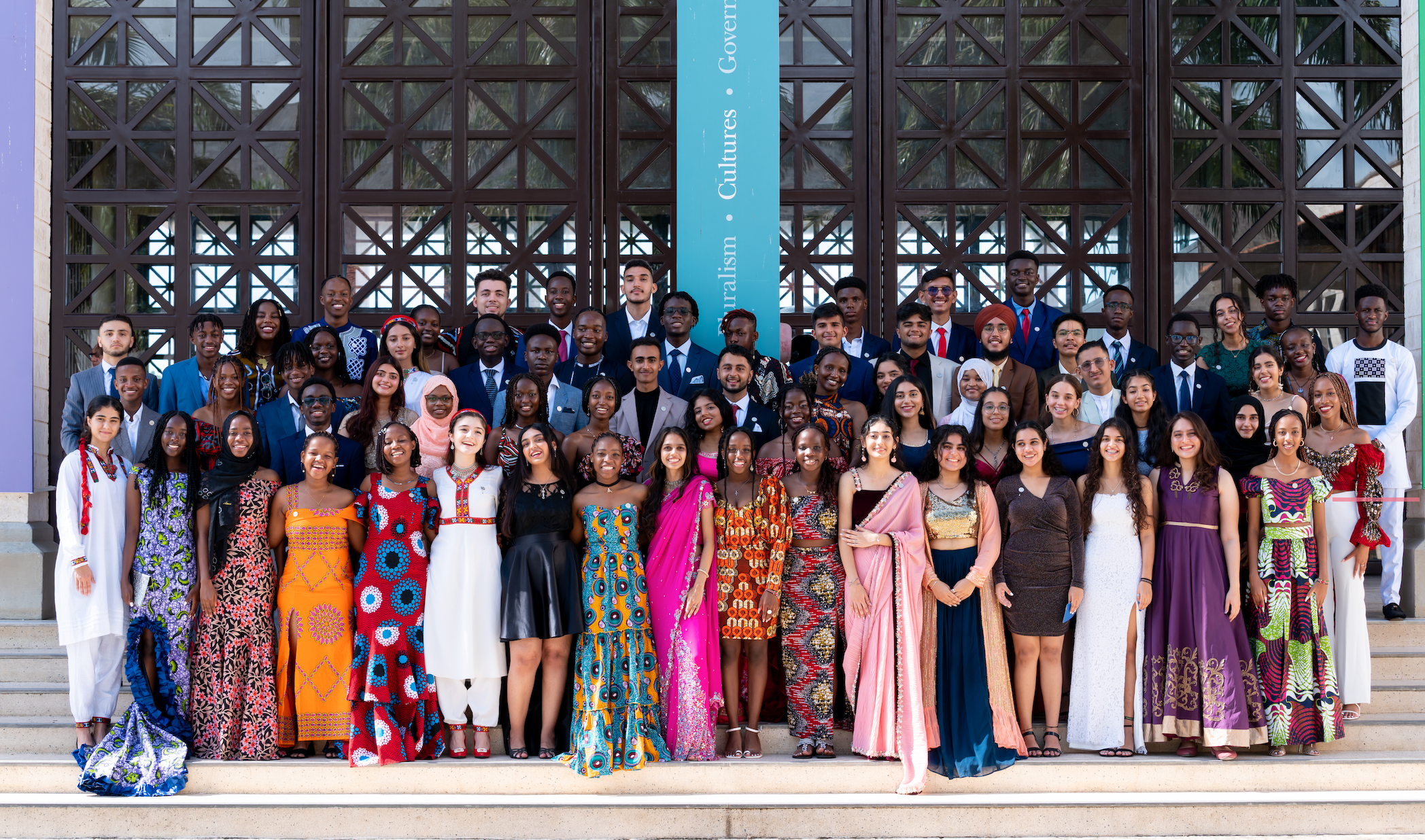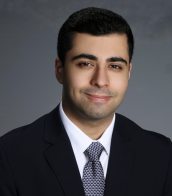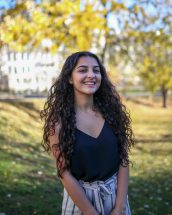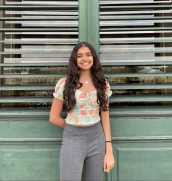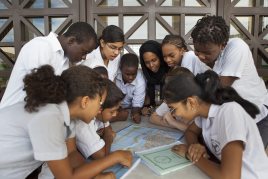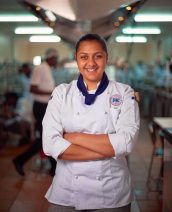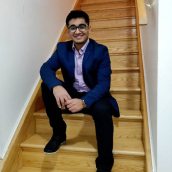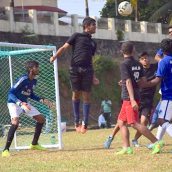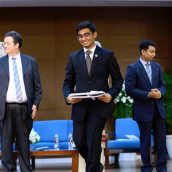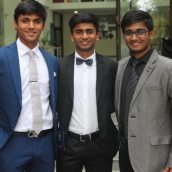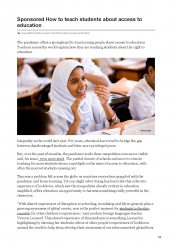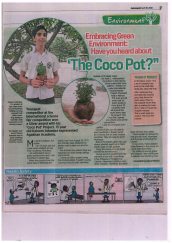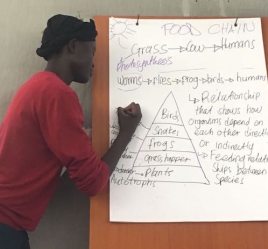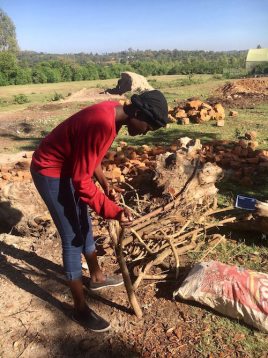At the Aga Khan Academy Mombasa, Ham Serunjogi – CEO and co-founder of African fintech giant Chipper Cash – realised the importance of staying connected to something larger than himself. The Forbes 30 Under 30 honouree is now serving as an advisor to the US President on African diaspora engagement.
Alumni
Education at its best facilitates positive growth in all domains – intellectual, social, physical, ethical and spiritual – leading to the well-rounded development of the child. The Aga Khan Academies aim toward this ideal, and the values they espouse are reflected in each school’s aspirations for its students.
The vision for Aga Khan Academy graduates
Students at an Academy pursue a well-balanced education combining intellectual inquiry, academic excellence, sporting and cultural activities, and a grounding in ethics and moral reasoning.
They are committed to rigour and self-discipline in their studies and subscribe to the principles of intellectual honesty in the preparation of their work.
Read more here.
The Aga Khan Academy Alumni Network
Fill out the AKA Alumni online questionnaire here
Connect with us via our Facebook and Instagram pages.
Interested to know more about our graduates? See spotlights on our alumni
Ariq Kapadia (Class of 2017): Using creative planning to make an impact
My time at the Aga Khan Academy Hyderabad has been a wonderful journey for me. I went through series of experiences that has made me what I am today. My friends, teachers and everyone around me had an integral part in shaping my life. I joined the Academy back in 2012 and the residence experience was completely new for me. I was frightened by the fact that now I must live away from my parents at such an early stage. This could typically be a nightmare for some students, but for me it was incredible – reflecting on my time there only makes me want to go back and relive my life at the Academy residences. Getting up for school, all the students racing for the washrooms only to win the chance to take the bath first. Planning out sports schedule in lunch breaks just to play a good soccer game after school. All this has been fun and amazing, and it has taught us students a way of life.
The Aga Khan Academy Hyderabad has been well known for years for their participation and success in soccer. Being an integral part of this team was a joyous and proud experience for me. I was selected for the team back in 2013 – at that time, our team had just started their dominance in the city while we were still preparing ourselves for other challenges at school. It was tough at first to balance sports and academics alongside other projects and activities; however, we slowly got acquainted with it. We used to plan out training times before and after school and commit ourselves to the sport. It helped me improve my punctuality and taught me a lot about time management. Soon after, I had the privilege of leading my U-16 team to the finals on home soil; unfortunately, we ended as runners-up, but the experience I gained while leading had brought some significant change in my behavior. I had grown a sense of responsibility and maturity – I had learned to be a leader. It did bring us trophies back to back for the next few years, but the true realisation for success came in 2016 when we got an opportunity to challenge teams at the national level. It was the first time a squad of eight students were sent for the TAISI tournament to represent the Academy. It was foremost the proudest moment of my life, standing alongside my teammates, ready to take up some of the best teams in India. Successfully, we won the tournament and brought the trophy back home, the first-ever away trophy that the Aga Khan Academy Hyderabad has ever won. Achieving such feat has been overwhelming, but the values I have learned in this experience will remain within me and will shape my future.
Along with sports, I completed various projects at the Academy. As part of our IB [International Baccalaureate] requirement, we had to complete personal projects and Extended Essays in order to pursue our interest in researching about various things through variety of subjects under experienced supervision. Not only did these projects let us gain experience in detailed researching, but it also helped create awareness in specific regions. These projects were bounded with criteria, ranging from personal interest to benefits in society and impact on environment. It made us think about the different aspects and potential effects of our projects, and in turn adopt a broader approach to our research. My project was about city planning and making solar energy the primary source of energy. I aimed to create a small model that gives a better representation of my idea about proper city planning. It was my first time working with wires and solar cells. I had to learn to make a solar plant model and integrate it in the main model. It really was great fun, and I learned the importance of city planning to reduce space wastage and save energy by using alternate renewable sources of energy. My Extended Essay was based on my favorite topic: healthy food. I conducted chemical experiments on food to check the alteration of protein content in food when cooked or uncooked and when hot or cold. My aim was to understand the effect of temperature on food. It went well and it answered some questions I personally had as well. I used dangerous chemicals and chemical equipment throughout my Extended Essay. I improved my personal skills in areas such as communications and built confidence in my ability to work individually. I learned more about society and gained a variety of knowledge on environment preservation.
During my time at the Academy, I have developed skills and values from certain experiences, but it was my participation in Model United Nations (MUN) that had a significant effect on me. I started participating in MUN to enhance my verbal skills and improve my knowledge about events happening around me. Over a period, I swiftly transited to the logistics group. I realized that my ability to manage and plan were beneficial to these events. I was given a chance to assist the Under-Secretary-General of Logistics and soon after I claimed the title for myself. Through this experience, I improved my management skills, developed various approach to different problems and mastered problem-solving skills as a result. I was given the opportunity to lead the Academy’s first ever METROMUN Conference, which allowed students from various schools to participate. The challenge of managing other students was very beneficial to me as it has boosted my confidence in my management skills. Once I had experienced managing MUN, I sought more knowledge and experience in this area – this helped me get into a co-op programme where I am currently working on certain projects and managing project teams to get the best results.
Over the period of time I spent at the Academy, I applied a common skill to all the initiatives in which I took part: strategic planning and creativity. Whether it was sports, projects or MUN, I was fond of innovation and had always been busy with creating something with whatever I had around me. When we plan our strategies for a soccer game, I loved coming up with interesting formations which sometimes didn’t make much sense. I would never give up trying to find a better one, sometimes I would modify the existing one or would come up with something new. Similarly, in MUN, I would plan to change the setting or come up with a different style of conducting the conference. I always looked for alternatives for the existing ideas to make them better or search for a new one to improve efficiency. All these made me realise that engineering is what suits me well and my interest in aerospace and machines brought me to continue my studies in Mechatronics Engineering at the University of Waterloo. Henceforth, with such knowledge, I can pursue my dream of developing my home town and making India prosperous in terms of knowledge and technology and to help His Highness achieve his vision of eliminating poverty.
All this knowledge and these experiences have helped me get into the University of Waterloo. Studying at my dream university is a direct result of what I have accomplished through hard work, determination and focus. My friends and teachers at the Academy supported me throughout, and all the memories I have from there still teach me various things in life. The experience that I had in those five years at the Academy continues to develop me further and make me more capable of success. In my engagement with activities at the university, I have found that all the skills I learned at the Academy have prepared me to face the upcoming challenges.
When I look back to five years ago, I see a small kid, terrified and trying to surpass the ranks. However, now five years later, even though I am still trying to achieve my goals, I feel ambitious and determined, not scared but instead craving to prove myself. I have had a lot from the Academy and now I feel it is my time to give back to society to make this world a better place to live in.
By Ariq Kapadia
17 year-old Virji, Aga Khan Academy student is passionate about providing sanitary towels to girls
Daily Nation features Ziyaan Virji, CEO and founder of AASW - Affordable and Accessible Sanitation for Women - during their event in early June, marking Menstrual Hygiene Week in their efforts to raise awareness about period poverty and take action with their local partners.
Lilian Odera (Class of 2015): Passionate about change in the community
Lilian Odera, a bona fide leader and advocate of change, is a 2015 alumna of the Aga Khan Academy Mombasa. Born in Kenya and raised in both Kenya and Germany, she speaks English, Swahili and German. Owing to this culturally diverse background, Lilian's parents were prompted to send her to AKA Mombasa, a pluralistic community she could thrive in.
The Academy nurtures future leaders through its unique curriculum and this provided the perfect environment for Lilian to hone her leadership skills. In addition to being an active sportswoman, Lilian served as a House Captain and member of the Student Representative Council. While in her last year of the International Baccalaureate (IB) Diploma Programme, she was awarded the Karen McKellin International Leader of Tomorrow (ILOT) award to study at the University of British Columbia (UBC). The award recognises students with superior academic achievement, leadership skills and involvement in community service.
“I would say my experience at the Academy was like a springboard into my future,” Lilian says of her time at the school. “I had amazing mentors and none of what I achieved would have been possible without their support.”
While at UBC, Lilian continued to pursue opportunities in line with her passion to effect change in the community. She has participated in several community-based projects including organising the first Afrocentrism Conference, which celebrated the identities of people with African descent. The successful event, which pulled in over 500 attendees and raised CAD $60,000, had acclaimed Kenyan author Ngugi wa Thiong’o as the keynote speaker. As part of her work as founder and event coordinator for a project that actively involved working with the community around her, she was awarded the prestigious Nestor Korchinsky Student Leadership Award in January 2020. In addition, she also recently marched with the Black Lives Matter movement in Vancouver, Canada. Lilian also won a $5,000 scholarship in 2019 and got into cooperative placement. In a nutshell, her experience at UBC was quite transformative, as she says, “I’m leaving UBC a different woman than I came.”
Although she has graduated with a Bachelor of Media Studies, Lilian is now looking to venture into education. While it is not a career path she imagined, her passion for directly working with people to creatively find solutions to issues is part of the reason she wants to get into education.
“I’ve witnessed how one event, how one change in policy can have a direct impact on how students adapt to new places, develop new relationships and understand themselves and the world around them,” says Lilian. “Although I’ve previously been shy about considering myself a leader, I've come to own that title in part because I've seen the level of trust and confidence people have put in me to execute a project. Being a leader comes with a lot of responsibility and I've never particularly been shy of putting in the work - just witnessing people's reactions, their joy, relief and celebration, is such an amazing reward in itself.”
If there's one lesson from the Academy she has continued to carry with her, it's the importance of being part of a community and working with the community. This has become apparent in all the community-based initiatives she has undertaken ever since leaving the institution.
"As I've grown, I've realised that my continuous involvement with community organisations here in Vancouver is in part influenced by that," Lilian states. "It is through community work that I learn more about myself and the world around me."
So what advice does she have for the young leaders at AKA Mombasa? “It's very easy to be narrowly focused on just grades. Yes, they are important, but life is not measured purely in letter grades. I recommend students seek out adventures and experiences to supplement what they learn in the classroom - whether it's travelling, volunteering at a charity, starting or joining a club. It's important to become holistic and wholesome, to be rich in experience and knowledge.”
Josephine Awino (Class of 2018): Cultivating a passion for sustainable agriculture
Josephine Awino, alumna of the Aga Khan Academy Mombasa, will be attending Wellesley College for her undergraduate studies in environmental science. She shares a reflection on her personal journey at the Academy in which she developed a sense of self and fostered her passions.
I was born in Mombasa, Kenya where my father worked as a photographer and my mother was a housewife. When I was three years old, however, my father died due to a tetanus infection. With no support from anyone in Mombasa, my mother was forced to move back home in Kisumu where the extended family was. Upon moving back, she had no job but still had to find a way to support my family as no one else would. She started farming vegetables at the family farm and sold her produce at the market and that’s how we survived for some time. At that time, farming wasn’t enough to support family needs and many times my family would go without a meal even for a whole day. Despite my mum farming food crops we still ended up having no food many times. I was enrolled at Tido Primary School where my siblings and I were fortunate to get sponsorship from an NGO who were willing to pay for our fees given our performance in class. My mother tried to carter for our uniform and food but she still wasn’t earning enough; when the NGO stopped supporting us educationally, I found myself home due to lack of fees. At that time, my mother wasn’t even able to pay for exam fees and went home without doing exams for the next grade. Coming from this background, where I hated my life and surroundings, I never stopped hoping for a better future for myself and my family. I just wanted to live like a normal child, doing normal things and not having to worry about whether I’ll have food for the next meal, or enough clothing, or if I’ll be allowed to attend class without the required fees.
Looking back at my mother who was raising five kids playing the role of both a mother and a father, I knew that she was doing the best that she could to raise and provide for us and I wanted to be able to help her in the future. I not only wanted to help her, but I didn’t want any family to end up like mine and kept on wondering what would happen if my mom went to school. She’d probably have a job and be able to support all of us comfortably. This is what motivated me all throughout my primary school, despite wanting to give up most of the time. I had managed to remain one of the top performing students in the class and my name never failed to be in the top 3. In grade 6, as one of the top 3 students, I was selected by the school for an interview for the Aga Khan Academy Mombasa where, if I was successful, I would get a full scholarship. I passed the interview and joined Aga Khan Academy Mombasa in January 2012 pursuing world class education in an environment that allowed me to focus on education while also taking part in extracurricular activities.
After high school, I will be joining Wellesley College in USA where I plan to venture into environmental science. Getting higher education abroad is particularly important for me. Since I am passionate about the environment and development, studying abroad will allow me to look at both issues from an international scale teaching to apply different solutions to local problems that Kenya currently faces. I will also be getting to know the bigger picture about environmental instability and development not only for Kenya but for the world at large; this is something that would be very hard to get at a local university. Getting to learn with people from all over the world is also another thing to add as I don’t only get to interact with them but I will get to know the kind of world they live in and what issues they face and how they approach them. This is beneficial for my growth and development in terms of applying different approaches to a problem, based on different perspectives from people all over the world.
After my studies I plan to come back to Kenya where I intend to apply all that I have learnt to solve local problems within my community and my country at large. One way I would like to do this is provide more educational opportunities for girls to attend school, making it a right rather than a choice so that less people end up like my mother did. I also want to venture into sustainable agriculture in a way that they would maximize their output while still not harming the environment. I want to make agriculture a reliable source of income for people in my community.
In my free time I like to read a lot. I read books and also read online. Reading helps me learn more about the world and also walk in other people’s paths of life. Through reading novels, I live another life. Through reading online, I tend to learn more about myself, exploring different things about myself while also learning about different issues affecting the world today. I research a lot about current issues mainly related to the environment and development just to keep myself up to date as well. As a person I would say that I’m an inquirer as I always want to know more and just look at another perspective on an issue. This helps me keep a balanced and understanding point of view especially when I interact with people.
I am also quite independent. Growing up and having no one to really rely on, I started sorting out my issues on my own without bothering my mum - this has really helped me grow to become my own person. My absolute passion lies with the environment and it’s beauty. This is something that I have been interested in from childhood because I’ve always felt a connection with nature and because of the different forms of environmental degradation I’ve seen which still haunt me up to date. When I see the environment degrading, even when I have no connection whatsoever with the issue, I usually feel responsible for the issue and grow this urge within me to stop the issues from carrying on. I have taught about the importance of the environment to various people in my community including students from my former school where I held my personal project - this has improved environmental conditions in my community.
By Josephine Awino
Swahili Day
Join us as we celebrate the rich Swahili language and culture this Friday, 28 April 2017.
JS Inter-house Sports Day
Join us for the annual JS Inter-House Sports Day at the field!
7th Annual Zawadi Bazaar
Join us on 2 December for a fun-filled day of food, crafts, and games for Zawadi Bazaar!
